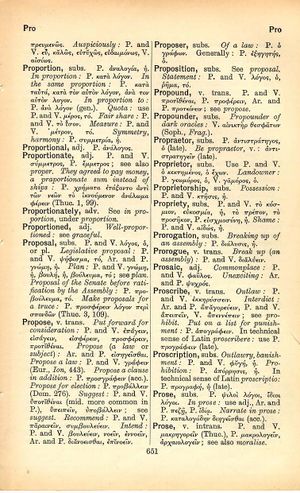propraetor
τὸ πεπρωμένον φυγεῖν ἀδύνατον → you can't escape your destiny | there is no escaping from destiny | it's impossible to escape from what is destined | it is impossible to escape from what is destined | what is fated is impossible to escape | if you're born to be hanged, then you'll never be drowned | he that is born to be hanged shall never be drowned | if you are born to be hanged then you'll never be drowned | if you're born to be hanged then you'll never be drowned| you can't outrun your fate | you cannot outrun your fate | you can't stop fate | that's the way the cookie crumbles
English > Greek (Woodhouse)
subs.
P. ἀντιστράτηγος, ὁ (late). Be propraetor, v.:ἀντιστρατηγεῖν (late).
Latin > English (Lewis & Short)
prō-praetor: ōris, m. (also prōprae-tōre or prō praetōre, indecl.),
I a magistrate in the times of the republic, who, after having administered the prœtorship one year in Rome, was sent in the following year as prœtor to a province where there was no army, a proprœtor (class.).—Form propraetor: cum bella a propraetoribus administrantur, Cic. Div. 2, 36, 76.—Form pro praetore, Sall. J. 103, 4: prorogatum Tubulo est, ut pro praetore in Etruriam succederet Calpurnio, Liv. 27, 22, 5.—
II One who administers the prœtorship of a province in the absence of the prœtor: Aulo fratre in castris pro praetore relicto, Sall. J. 36, 4: quem pro praetore in castris relictum supra diximus, id. ib. 37, 3; Liv. 10, 25, 11; 29, 6, 9; Tac. A. 2, 66 al.; Caes. B. G. 1, 21.

